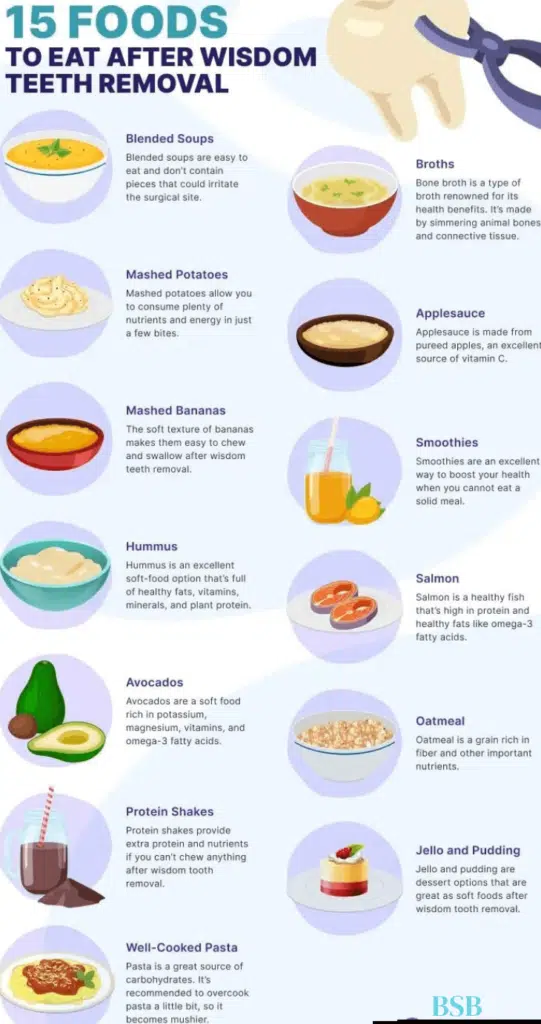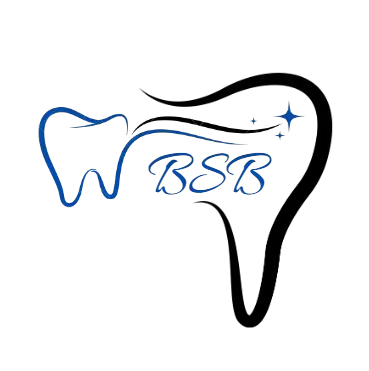Many people find it painful when wisdom teeth begin to grow. It’s common for these teeth to be impacted, meaning they get trapped in the jaw or under the gums and don’t come in the right position. This can lead to various problems such as infected teeth, cysts, gum disease, and decay. In such cases, a dentist will likely recommend surgery to remove the affected teeth.
After surgery, you may experience swelling and mild discomfort. You will need to modify your diet to include foods that are easy to chew and won’t cause pain. About 7% of people experience trismus (difficulty opening the mouth), which can make chewing, swallowing, and overall food intake more challenging. It’s important during these days after the removal to be thoughtful about how you use your mouth to ensure the wounds heal properly.
What habits to avoid after wisdom tooth surgery?(short answer )
Best Foods to Aid Recovery After Wisdom Teeth Removal
After wisdom tooth removal, it’s essential to follow your oral surgeon’s advice and drink lots of water to stay hydrated. You need to eat soft foods that you can easily tolerate to ensure you’re getting enough protein, vitamins, and minerals. These nutrients are crucial for the healing process and wound healing. Malnutrition can slow down your recovery and lead to complications.
After the extraction, you’ll likely experience swelling in your mouth and cheeks, which can make eating difficult. Using ice packs and pain relief can help reduce pain and swelling, but it’s important to be smart with your eating to avoid further complications.
Minimizing Problems During the Recovery Phase
One major concern after surgery is developing a dry socket. This happens when the blood clot at the extraction site fails to form properly or becomes disrupted, exposing the bone and nerves and causing severe discomfort. To prevent this condition, you should avoid eating foods that can get stuck in the socket or irritate the area. If left untreated, a dry socket can lead to infection with symptoms like fever, discharge, and increased sensitivity. In such cases, antibiotics and a dental clean may be required.
Pay close attention to your diet during the recovery to help your body restore strength and promote healing. On surgery day, have a list of suitable foods ready in your kitchen to ensure a smooth recovery.
Surgery Day Meal Suggestions
After wisdom teeth removal, it’s crucial to give your mouth time to heal properly. During the initial day, focus on soft foods and liquids that require no chewing to avoid irritating the surgical sites. Foods like applesauce, pureed fruits, baby food, and warm broth are excellent choices. As you progress through the first 24 hours, incorporate items like cream soups, smoothies (but remember, no straw), cottage cheese, milk, pudding, and jelly.
Yogurt and hummus can provide some variety and protein shakes are beneficial for wound healing.After the first 48 hours, you can start reincorporating slightly more solid foods such as scrambled eggs, Greek yogurt, and cooked lentils. Gradually move to semi-soft foods like pasta, soft vegetables, chicken, and beef as your mouth feels less tender and sensitive. By the second day and third day, you can begin to transition to even harder foods. Keep drinking plenty of water to keep your mouth clean and bacteria-free.
Smoothies remain a popular choice, but be cautious with straws as the sucking motion can dislodge the developing clot, delaying healing. Opt for a spoon instead.Your best friend during recovery will be nutrients that are easy to digest. Consider milkshakes, creamy peanut butter, and nutritional supplement drinks like Ensure, Boost, Carnation, or Glucerna. Bouillon and sherbet are also good options. Avoid smoking as it can create a suction vacuum, risking dislodging the blood clot and prolonging the duration of your recovery.
How Long to Wait Before Eating After Dental Work?
After surgery, it’s important to be mindful of how you feel due to the numbness from the anesthesia. This factor can make it difficult to coordinate your lower jaw for eating and drinking immediately after surgery. You might experience trouble swallowing or even drooling until the anesthesia wears off.
Be careful with your food choices during this time. Chewing foods while you’re numb can cause you to bite your tongue and cheeks. Stick to liquids or soft foods that don’t require much chewing until you regain feeling around your mouth.
What to Avoid Eating After Wisdom Teeth Extraction
After wisdom teeth removal, it’s crucial to be mindful of your eating habits to ensure a smooth healing process. Initially, avoid any foods that require chewing as they can negatively affect the extraction wound. As you progressively incorporate more foods into your diet, you should still steer clear of spicy, crunchy, and crumbly foods, as well as anything containing grains or seeds. These can easily get lodged in the wound and irritate the surgery spots, which can slow down healing.
Additionally, hot foods and drinks can prolong swelling, so keep the temperature of your meals in mind. Refrain from consuming alcohol, soft drinks, and caffeinated beverages for at least five days post-surgery, as these can disturb your teeth and mouth. Avoid acidic beverages, steaming coffee and tea, and hard snacks like chips, popcorn, and cookies. Chewy items such as candy and carbonated drinks like soda and seltzers are also best left out of your diet during this period.

Avoid These Habits After Wisdom Teeth Removal
Avoid using straws
After surgery, it’s vital to avoid using straws when drinking. The sucking action can dislodge the blood clot in the tooth socket, where the tooth was removed, leading to bleeding and severe pain from a dry socket.To prevent this, don’t use straws for at least a week. Always consult your dentist to determine when it is safe to use straw.
Avoid rinsing and spitting
After surgery, avoid rinsing or spitting for the first 24 hours to protect the surgical site. Instead, lean over a sink and let saliva and blood dribble out naturally, which is a safe way to remove unwanted fluids from your mouth.
Do NOT Use Tobacco During Recovery
After wisdom teeth removal, avoid smoking, tobacco, vape pens, or chewing pouches as they hinder the healing process. These products reduce oxygen in your bloodstream, delaying recovery and increasing infection risk. It’s crucial to stop using them, especially in the first 72 hours post-surgery. If quitting is difficult, try a nicotine patch. For optimal healing, complete cessation of nicotine is best to prevent complications.
Wisdom Teeth Removal Food Timeline
If your surgery requires general anesthesia, you’ll need to fast for about 12 hours before your appointment time. After your wisdom teeth removal appointment is over, you can begin eating again after a few hours. Initially, you’ll need to stick to soft foods for at least a week to allow proper healing.
Here’s a simple timeline of what to eat:
- First 24-48 hours: Focus on liquids and extremely soft foods such as blended soups, apple sauce, and yogurt.
- Day three or four: Introduce semi-soft foods like eggs and oatmeal into your diet.
- Day five and beyond: Start gradually transitioning to solid foods. If you find chewing is still painful, continue with soft and semi-soft foods until you can comfortably chew solid foods.
Gentle Methods for Clearing Wisdom Teeth Holes
After wisdom teeth removal, patients often worry about getting food stuck in the holes left behind. To prevent this, it’s best to stick to eating soft foods and carefully chew away from the extraction site. However, if food gets lodged in the extraction area, using a gentle saltwater or herbal tea rinse can help dislodge it.
During the first 24 hours after the extraction process, it’s important to avoid swishing liquids vigorously in your mouth as this can disrupt the healing process and dislodge the blood clot forming in the area. Instead, let the liquid naturally fall out of your mouth without spitting.
Liquid Diet: First 24 Hours After Surgery
Once the initial 24-hour recovery period has passed, you can begin introducing soft foods into your diet. A soft food diet includes:
⦁ Steamed (soft) vegetables
⦁ Apple sauce (pureed produce)
⦁ Bananas
⦁ Mashed potatoes
⦁ Avocado
⦁ Cottage cheese
⦁ Soft bread (not crunchy)
⦁ Oatmeal
⦁ Pasta
⦁ Noodles
⦁ Beans
⦁ Eggs
⦁ Tofu
⦁ Thinly Sliced Cheese
Foods to Avoid During Recovery
During the recovery period after your wisdom teeth extraction surgery, it’s crucial to focus on the right diet to support the healing process. Eating the wrong foods can not only hinder your recovery but also increase the risk of developing complications. To ensure a smooth recovery, you must avoid certain foods and beverages. These can hinder the healing and might even cause additional complications during the recovery phase.
⦁ POPCORN
⦁ Acidic foods and drinks (lemon juice, orange juice, vinegar, etc.)
⦁ Spicy foods
⦁ Alcohol
⦁ Small grains, nuts, and seeds (rice, quinoa, poppyseed bagels, sunflower seeds, etc.)
⦁ Crunchy foods (crackers, chips, etc.)
⦁ Chewy foods (taffy, jerky, etc.)
⦁ High-sugar foods and drinks
Conclusion
after wisdom tooth surgery, it’s important to follow your dentist’s advice, avoid habits like using straws, and maintain a soft, nutritious diet to promote healing. Be mindful of potential complications such as dry socket, and manage swelling with ice and pain relief. Gradually reintroduce solid foods as your mouth heals, and stay hydrated to support recovery. With proper care, you’ll minimize discomfort and ensure a smooth healing process.
Ferquently Asked Questions(FAQ’s)
How soon after wisdom teeth removal can I eat spicy food?
In the following 7 days after wisdom teeth removal, avoid eating anything that might negatively affect the extraction wound. Gradually incorporate other foods, but steer clear of spicy, crunchy, crumbly items, and those with grains and seeds.
When can I eat rice after tooth extraction?
2 to 5 Days Post-Surgery
After a wisdom tooth extraction, it’s important to be cautious with your diet to ensure a smooth recovery. In the first couple of days, focus on soft foods to aid healing. If your recovery is progressing well, you might be able to incorporate more variety into your diet. Around this time, you can eat very well-cooked rice as it is gentle on the healing gums. Make sure the rice is soft and easy to swallow to avoid any complications.
Can I eat noodles after tooth extraction?
By the third and fourth days after a tooth extraction, the pain might have lessened, and your gum may not hurt as much. At this point, you can start enjoying semi-soft foods that don’t require much chewing, such as scrambled eggs, cottage cheese, instant oatmeal, sandwiches, and noodles. These options are gentle on your healing gums and provide the necessary nutrients without causing discomfort.Consider adding a brightsmileblend smoothie to your meal for extra nourishment.

